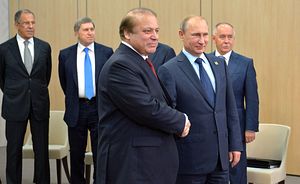Traditionally, Russia has maintained cordial relations with India, with an overwhelming focus on the defense sector. Both nations signed the Treaty of Peace, Friendship and Cooperation In 1971, which specified mutual strategic cooperation. For a long period of time, Russia enjoyed the status of the largest arms exporter to India. After the establishment of U.S.-India strategic relations, however, Russia gradually started to lose lucrative defense deals to U.S. firms. Consequently, in 2014, the United States surpassed Russia and became India’s biggest defense partner in terms of arms sales.
While in 2015 Russia regained its title as India’s top source of arms with a series of deals, the fallout from India’s warming strategic relations with Russia’s ideological rival was noticeable when Moscow struck a surprising defense cooperation agreement with Islamabad. The 2014 agreement was finalized when Russian Defense Minister, Sergei Shoigu visited Pakistan. It was the first visit by a Russian defense minister to Pakistan in 45 years. The Russia-Pakistan agreement provides for the exchange of information on politico-military issues; cooperation for promoting international security; intensification of counterterrorism and arms control activities; strengthening collaboration in various military fields, including education, medicine, history, topography, hydrography, and culture; and sharing experiences in peacekeeping operations.
In August 2015, Russia agreed to sell Mi-35M attack helicopters to Pakistan. Pakistan plans to procure a total of 20 Mi-35Ms over the next years and has received four helicopters in August 2017 at a cost of $153 million. Both nations are also negotiating a deal on Su-35 and Su-37 fighter jets.
In addition to that, both Moscow and Islamabad have enhanced military to military relations. The first ever joint military exercise, Druzhbha (a Russian word meaning “friendship”), was conducted between the two armies in September 2016. Russia also participated in the Aman-17 international naval exercise hosted by Pakistan in the Arabian Sea in February 2017.
In addition to a rising and close strategic cooperation, both Russia and Pakistan are collaborating in the energy sector as well. On October 16, 2015 Pakistan and Russia signed an agreement to build a $2 billion pipeline. The North-South gas pipeline, with a capacity of 12.4 billion cubic meters per year, would connect the liquefied natural gas (LNG) terminal in Karachi to Lahore. The agreement was signed during the first visit by a Russian energy minister to Pakistan in three decades, and marked a new beginning in commercial ties between the two countries. The 1,100 kilometer pipeline is expected to be completed by 2018.
In addition, on July 3, 2017 Russia’s Gazprom International and Pakistan’s Oil and Gas Development Company Limited (OGDCL) signed a Memorandum of Understanding (MoU) in Moscow. The MoU is aimed at mutual cooperation, joint ventures and use of state of the art technology that would aid exploration and development in Pakistan.
Fearing a great power aligning with its rival, India reaffirmed Russia’s largest arms importer title during President Vladimir Putin’s visit in December 2014. A $40 billion deal was struck to build 10 more nuclear plants in India, in addition to a $3 billion agreement to manufacture Russia’s most advanced Kamov-226 helicopters in India. Moscow and New Delhi have been in talks for over a year about the purchase of five systems of S-400 missile defense systems.
The increased Russia-Pakistan cooperation should be viewed in the context of increasingly complex challenges being faced by Moscow in the evolving Afghan scenario. Russia considers Pakistan as highly important for the stabilization of Afghanistan, as it believes that “the problem of Afghanistan cannot be resolved without the constructive involvement of Pakistan and Iran.” Keeping in view Russia’s closeness to India and rising understanding with Pakistan, Moscow seems in a position to mediate on all outstanding issues between the two South Asian rivals. Specifically, Russia can persuade India regarding Pakistan’s position in Afghanistan.
Kashif Hussain holds M.Phil Degree in International Relations from Quaid i Azam University Islamabad, He is currently serving as Research Associate at Strategic Studies Institute Islamabad (SSII).
































